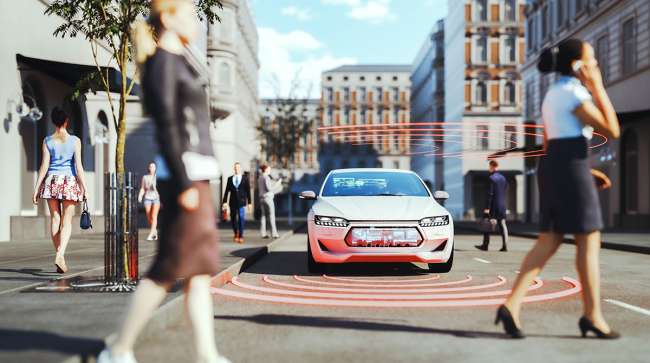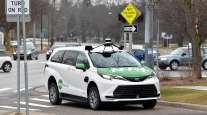Senior Reporter
Republican Policymakers Spotlight Autonomous Vehicles’ Benefits

[Stay on top of transportation news: Get TTNews in your inbox.]
Approving a regulatory framework for autonomous vehicles would facilitate the technology’s adoption throughout the national transportation landscape, top Republicans on a U.S. House committee indicated this month.
Rep. Gus Bilirakis (R-Fla.), chairman of the House Innovation, Data, and Commerce Subcommittee, recently pointed to potential benefits that would result from a mainstream reliance on the technology.
“For something like autonomous vehicles, that will help senior citizens and Americans living with disabilities, it means reducing barriers to testing, and setting the standards for how they will be adopted across the world, and provide certainty for businesses and consumers,” the congressman said at a hearing Feb. 1.
“America’s global leadership depends on its people to be best in class, and we must give them the regulatory certainty on emerging technologies they need in order to live up to their legacy,” he added.
Fellow Republican policymakers have signaled the potential for considering autonomous vehicles legislation during this session of Congress. They also have emphasized a need for preserving a domestic technological edge over China.

McMorris Rodgers speaks at a past event. (Al Drago/Bloomberg News)
Rep. Cathy McMorris Rodgers (R-Wash.), chairwoman of the Energy and Commerce Committee, observed, “It’s important that we also take action to ensure the development and deployment of autonomous vehicles.”
“The regulatory framework for [autonomous vehicles] must be led by the U.S.” the chairwoman continued, “to win the future, the U.S. must lead on AVs. We must chart the path so the road is one we design.”
Last year, a bipartisan group of lawmakers launched the Congressional Autonomous Vehicle Caucus. The group’s aim was to establish a federal framework for guiding agencies and industries with the deployment of autonomous vehicles. Legislation outlining the caucus’ intentions did not reach the president’s desk.
Various industry stakeholders, as well as proponents of the technology continue to call on lawmakers to facilitate access to the marketplace. Addressing members of the Energy and Commerce panel, Jeff Farrah, executive director of the Autonomous Vehicle Industry Association, proposed that Congress enact legislation outlining necessary statutory and regulatory provisions. Doing so, he argued, would “maintain and strengthen American leadership in the AV industry.”
Specific to the freight industry, Farrah noted potential benefits expected from autonomous trucking. Such benefits included the likelihood of enhancing supply chain efficiencies, amplifying the workforce and addressing safety operations. As he put it, AV trucking is “positioned to substantially decrease the cost of goods while fundamentally improving interstate commerce by changing the manner and speed in which goods move in our country, all while making roads safer for everyone.”

Farrah
“Given the timeline for AV truck deployment, autonomous trucking is not likely to cause significant displacement of jobs in the trucking industry, but it can serve as one tool to reduce strains on the supply chain caused, in part, by the longstanding truck driver shortage,” he went on.
American Trucking Associations determined the industry’s workforce is short about 78,000 drivers, which was a slight decrease from an earlier estimate.
The Biden administration has responded to safety concerns along freight and passenger mobility corridors. For instance, the U.S. Department of Transportation launched the National Roadway Safety Strategy campaign. Stakeholders were called on to continue with efforts that result in reductions to serious injuries and deaths along roadways.
“Traffic crashes cost tens of thousands of American lives a year — a national crisis on our roadways — and everyone has an important role to play in addressing it,” Transportation Secretary Pete Buttigieg said Feb. 3. “Today we are issuing a national call to action and asking all Americans—including private industry, nonprofit and advocacy organizations, and every level of government — to join us in acting to save lives on our roadways.”

Host Seth Clevenger speaks with autonomous vehicle pioneer Don Burnette about the pros and cons of driverless cars and trucks. Hear the program above and at RoadSigns.TTNews.com.
Third of a three-part series on autonomous vehicles. Hear Part I here, and Part II here.
American Trucking Associations announced it joined USDOT’s National Roadway Safety Strategy call to action.
“Through our Share the Road program, our Law Enforcement Advisory Board and our ongoing work zone safety awareness campaign, ATA is committing to educate the public about the importance of safely sharing the road with large trucks, practicing safety in construction zones and enhancing the partnership between the trucking industry and law enforcement to address highway safety issues,” said Dan Horvath, ATA vice president of safety policy.
Relatedly, companies, such as mobility analytics firm INRIX, announced services meant to improve highway safety. The “Safety View” cloud-based application, in collaboration with General Motors, is designed to assist agencies with “Vision Zero” plans to arrive at zero traffic-related deaths.
“Now more than ever is the time to invest in and utilize data to better inform the future of our roadway networks and to understand how things may vary based on demographics and at the community level,” Bryan Mistele, co-founder and CEO of INRIX, said in August.
Want more news? Listen to today's daily briefing below or go here for more info:




